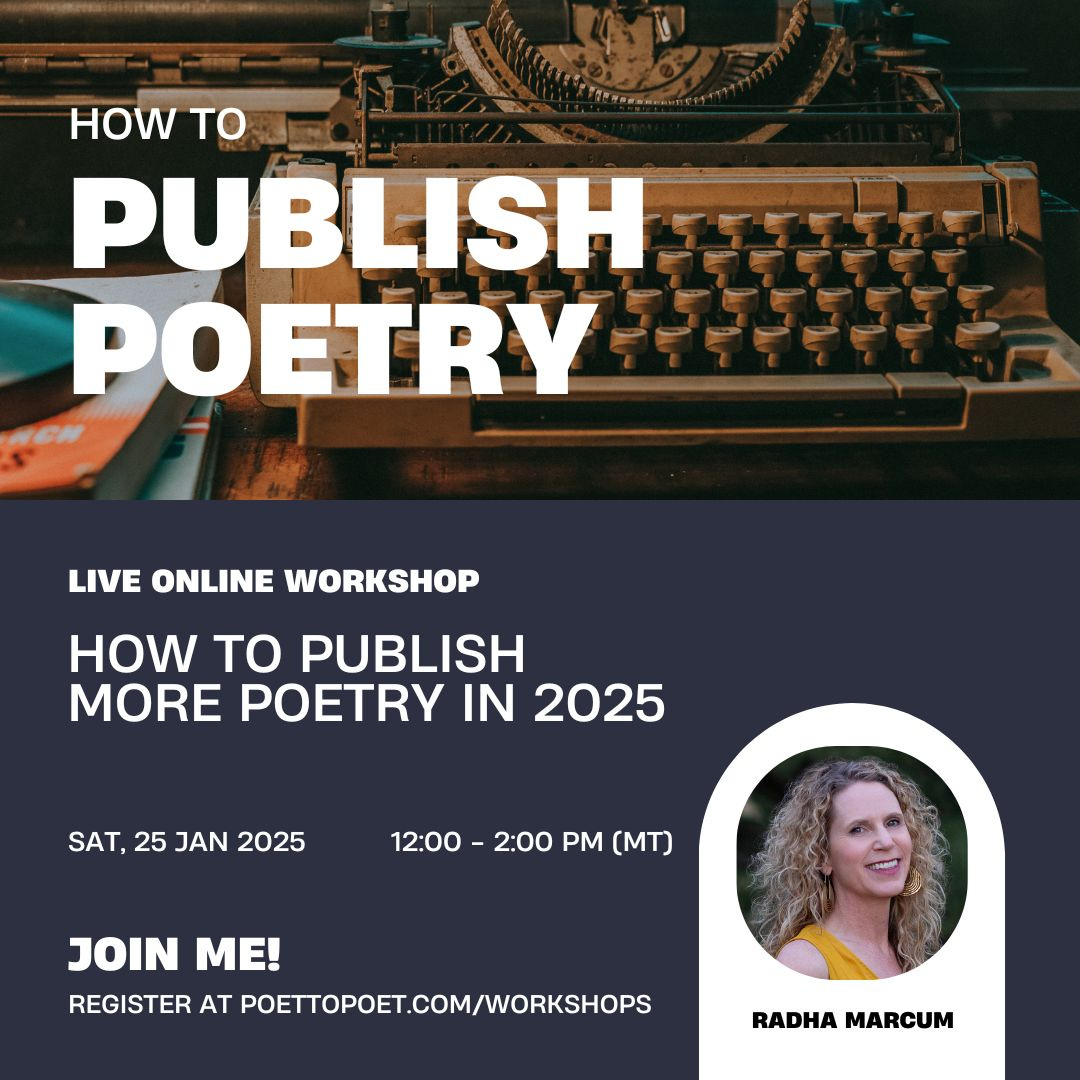The Wisdom of No Excuses
How to keep your poetry practice—and publishing aspirations—alive when life throws $%*# at you.

On January 25th, I’ll be offering How to Publish More Poetry in 2025, a two-hour intensive for practicing poets. If this post resonates, I hope you’ll join us.
The Wisdom of No Excuses
When life gets overwhelming, the first thing we tend to set aside is our publishing aspirations. I know. For years, especially when my kids were younger, I would tell myself I'd get back to submitting "when things settle down." Of course, things never really settled down—they just shape-shifted into new challenges, new demands on my time and energy.
To be clear, I have always had to juggle poetry aspirations with … everything. I’ve worked mostly full time at non-literary work since I was seventeen. I’ve been paying bills. And more bills. I still don’t apply to residencies, not because I don’t relish the idea of dedicated creative time with other creatives, but because I simply can’t afford them—the cost of getting there, the loss of income during that time.
I’m not complaining. I just want to be clear that I am speaking from the trenches. If you’re also there, I see you. It won’t ever be easy, but if I can achieve my aspirations while managing life’s $&*# storms, so can you!
A Strategy That Holds
If I've learned anything from decades of writing and publishing, it's this: having clarity about the essential qualities of my poetry and where that work is likely to resonate in the world makes it possible to keep moving forward, even when life seems downright unfair.
In my last post, I shared two keys to publishing more poetry:
Knowing and naming the essential qualities of your unique voice
Building a solid list of aligned publishers and having a clear submission plan
What I didn't talk about was how having these tools hasn't just helped me publish more poems or finish my manuscripts—they’ve become my anchor during some of the hardest seasons of my life.
During the COVID lockdowns, I found myself tethered to my screen at a desk in a small house with three other humans and a 60-pound dog. Like so many of us, I was overwhelmed by the need to keep working while emotionally supporting two teens through so much uncertainty. Added to that, in 2021, there was a mass shooting at our local supermarket and a wildfire burned over 1,000 homes near our neighborhood. Talk about distressing.
It would have been easy to shut down my creative aspirations. Instead, I leaned into my work and refined my submission strategy. Finishing and sending out poems—even just one or two at a time—became a touch point, a way to stay connected to something larger than the daily anxiety.
Then there was 2022—the bittersweet whirlwind of launching my first kid to college while recovering from an accident that broke two vertebrae in my neck. Between physical therapy and endless checklists and the weight of upcoming goodbyes, poetry publishing tasks could have easily slipped away.
Instead, my submission plan became a kind of ritual—fifteen minutes here, thirty minutes there, between packing and having those heart-full conversations that mark the end of one family chapter and the beginning of another. I finished the manuscript I’d started during the pandemic and, in 2023, it received the Washington Prize.
Now, more recently, I’ve been helping my second child apply to college while seeing my husband through cancer treatments. Admittedly most weeks it feels selfish, if not impossible, to focus on creative work. But having a clear framework means I keep taking tiny steps forward—maybe just adjusting a single draft or sending out one submission packet—even on the hardest days.
Sometimes those small actions are what help me stay whole.
Beyond Excuses
No matter how valid, excuses used to hold me back. Growing into my life as a poet has meant acknowledging that days are always going to be messy and unpredictable. There will never be a breezy year, a predictable week, a perfectly clear hour. If I wait for the “right” time to focus on getting my creative work out there, I'll be waiting forever.
There are plenty of days when exhaustion wins, doubt creeps in, and I just want to put everything on hold and binge old seasons of Survivor. But having a strategy means I don’t rely on willpower or inspiration. I just take the next step. For example:
Knowing my voice gives me a kind of compass. I have an appreciation for the current body of work in process, work that returns to certain themes and stylistic choices that feel “alive” to me. Knowing these poetic preoccupations actually helps me process difficulty—my husband being sick, for instance. I tap a familiar personal language during an unfamiliar experience. I'm not just writing and publishing from a new perspective—I'm continuing a conversation I've been having with myself and the world for decades.
Having a clear submission plan. On days when I can't summon the energy to generate or revise work, my submission plan gives me small, concrete ways to stay connected to my practice. I might spend fifteen minutes updating my submission tracking spreadsheet, or mark important journal deadlines in my calendar. Sometimes just preparing a cover letter or organizing poems into submission sets helps me feel like I'm moving forward when everything else feels stalled.
Your Keys to Publishing in 2025
When I'm going through difficult times, I've found that these two keys—knowing my voice and maintaining my submission plan—become more than just publishing tools. They're lifelines to my creative self.
It's not just about getting more poems into the world (though that's wonderful). It's about staying connected to your essential creative self, especially when life tries to pull you under.
If you’re hoping to publish poetry in the next twelve months, join me for How to Publish More Poetry in 2025. I’m looking forward to sharing everything I know about how to develop a strategy that can weather any storm—whether that's a global pandemic, a personal crisis, or just the everyday chaos of being human.





It's amazing what you've accomplished, despite unexpected obstacles and chosen responsibilities, during what is arguably life's busiest decade. When I was in that frenetic decade, I created Monday Editions, my little publishing imprint for comics, zines and, now, poetry micro-chapbooks. It wasn't because I had time on my hands. The name comes from my decision that, no matter what editorial deadlines and family obligations might be calling, Mondays were for writing. Period. As you know so well, if our writing doesn't matter first to us, it won't matter to anyone else at all. Selfish? Sometimes. So be it. Carry on.
❤️❤️❤️
Radha, I didn't realize everything you've been going through - it only makes me admire you and your sensitive work more, along with great sympathy for the challenges. This resonates with me so much, with both writing and painting, where I've for so long failed to take myself seriously and make the time, and am often overwhelmed or made cynical by life challenges. Thank you for this post.